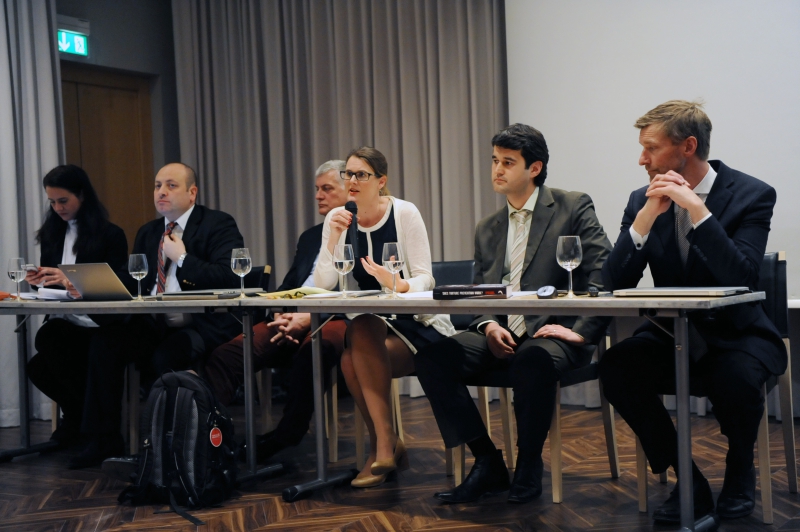
Location
Vienna, AustriaAttendance
Invitation Only
Date & Time
Start: 28/03/17 00:00
End: 28/03/17 00:00
VIENNA, AUSTRIA – 28 MARCH 2017 The important role of procedural safeguards in the prevention of torture and other ill-treatment in police custody and during criminal investigations, as well as a discussion on developing a universal set of standards for non-coercive interview- and evidence-gathering methods, were the focus of a […]
VIENNA, AUSTRIA – 28 MARCH 2017
The important role of procedural safeguards in the prevention of torture and other ill-treatment in police custody and during criminal investigations, as well as a discussion on developing a universal set of standards for non-coercive interview- and evidence-gathering methods, were the focus of a workshop held in Vienna on 28 March 2017.
Delegates from 36 OSCE participating States and other stakeholders attended the event organised by the OSCE Office for Democratic Institutions and Human Rights (ODIHR), the Permanent Mission of Denmark to the OSCE and the Convention against Torture Initiative (CTI).
The workshop was introduced by ODIHR Adviser on Torture Prevention, Ms. Stephanie Selg, moderated by Ms. Alice Edwards, Head of the CTI Secretariat, and benefited from the important reflections on safeguards in practice from panellists: Mr. Octavian Ichim, Europe and Central Asia Programme Officer, Association for the Prevention of Torture (APT); Mr. Asbjørn Rachlew, Superintendent of Norwegian Police and Current Researcher at Norwegian Centre for Human Rights (Norway); Mr. Michael Kühl, German Police Officer (ret.) and international consultant on rule of law and community policing (Germany); and Mr. Mushegh Yekmalyan, Head of European Affairs, International Rehabilitation Council for Torture Victims/Civic Solidarity Platform. A short video message from Mr. Juan Mendez, former UN Special Rapporteur on Torture, was also played.
The event highlighted practical experiences of law-enforcement agencies in using procedural safeguards to improve the effectiveness of criminal investigations and prosecution, as well as, in some instances, to protect the police against false accusations of abuse. According to research published by the APT*, granting detainees certain fundamental rights, such as access to a lawyer and a medical doctor and notification of arrest and place of custody to third parties, reduces the incidence of torture and abuse over the long-term. Monitoring places of custody by independent bodies was also emphasised.
“Upholding the highest standards with regard to the absolute prohibition of torture and other cruel, inhuman or degrading treatment or punishment is crucial to ensuring comprehensive security in our region,” said H.E. Ms. Liselotte Plesner, Denmark’s Permanent Representative to the OSCE. “In 1990, in Copenhagen, we as OSCE participating States committed ourselves to keeping interrogation rules, instructions, methods and practices under systematic review. This workshop provided an excellent opportunity to re-emphasise this commitment by discussing new developments and good practices from the OSCE region.”
Another important message from the event was that developing crime-investigation methods to move away from sole reliance on confessions for securing convictions, and excluding torture-tainted evidence from any proceedings are also essential in the fight against torture. Norwegian police superintendent Mr. Asbjørn Rachlew noted that, “If we want the police to change, we have to provide them with an alternative way of doing business”. The good news is that there are now 30 years of scientific research to demonstrate that humane investigative interviewing, which aims to test all possible hypothesises and seek the truth rather than interrogations being focused solely on extracting confessions, is effective. Mr. Rachlew added, “Investigative interviewing works in all scenarios – whether for ordinary criminal investigation, for security or terrorism cases, or for intelligence gathering.”
Ms. Stephanie Selg, ODIHR Adviser on Torture Prevention, offered OSCE’s support to participating States to learn more about good practices from the OSCE region, stating “There is no doubt that the risk of torture drops significantly when procedural safeguards are respected.”
For the CTI, the workshop was another fruitful collaboration with the OSCE and “brings us one step closer towards one of the objectives of the CTI: universal implementation of the UN Convention against Torture,” said Ms. Alice Edwards, Head of the CTI Secretariat.
Austria’s 2017 OSCE Chairmanship, together with the French, German, Norwegian, Swiss and UK governments, supported the workshop.
—————————–
* Richard Carver and Lisa Handler, Does torture prevention work?, Liverpool University Press 2016

